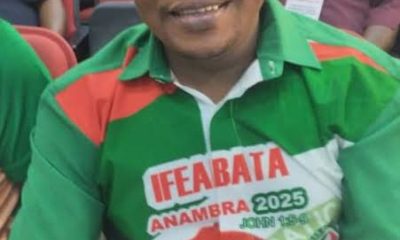Opinion
OF DUROSINMI MESEKO, FEDERAL GOVERNMENT BOARDS, AND NATIONAL SERVICE
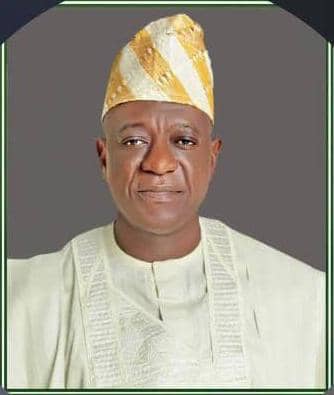
BY BOLAJI AFOLABI
Immediately after the declaration of Senator Bola Ahmed Tinubu as winner of the February 2023 Presidential election by the Independent National Electoral Commission, (INEC), there were vivacious and spontaneous celebrations among supporters, party members, and other people. For some members of the All Progressives Congress, (APC), the party’s victory signalled rays of hope for possible appointments in the in-coming government.
Following his inauguration as the President and Commander in Chief of the Federal Republic of Nigeria; the 5th in the 4th Republic, on May 29, 2023, party members and loyalists were brewing with enthusiasm and excitement about getting positive look-in for appointments in the new government.
True, there was nothing abstract, and unreasonable about this. As is common in politics, every member of the victorious party in any political battle, always desire to savour some slice of the “spoils of war.” Even in the United States of America, the United Kingdom, and other democracies in different climes, it is the same practice. Perhaps, politicians have better understanding of “labourer is worthy of his wages” as elucidated in the Good Book. For many, having toiled and traversed within space and spans across the country, campaigning and marketing the party’s candidate, it is not out of place to benefit from the many offices to be filled.
Days, and weeks into the commencement of his government, President Tinubu made some appointments. In quick successions, the offices of the Secretary to Government of the Federation, (SGF); Chief of Staff, (CoS); Security Adviser (which later became National Security Adviser, NSA); and few others were filled. To underscore his commitment to governance, and the enthronement of focused leadership, list of ministerial-nominees were made public, and sent to the Senate for necessary legislative inquisition. After successful vetting, and screening, the nominees took oath of office as Ministers, and Members of the Federal Executive Council, (FEC) in August 2023. Thereafter, few appointments were made as Heads of Agencies, and other Parastatals. These appointments, as expected, elicited the commendation of party members; particularly those who had eyes on Board appointments. Some made bold conjectures and calculations that with the speed and pace at which the appointments were done, Tinubu, in no time, would enlist more people to serve, in various capacities in his government.
However, from the first to the third quarter of 2024, the sweet melodies from prospective, and expectant appointees to the Boards of Federal Government agencies began to drift.Though more executive appointments were made by Tinubu, in some ways, it did not entirely boost the morale and expectations of many Boards-applicants. A school of thought argues that the long delays of Board appointments may affect party loyalty, and confidence building of members; particularly those who worked assiduously for the February elections victory.
Another school of thought wondered why Board appointments; which represents huge gamut of offices, was not filled. Yet, a different school of thought posited that if appointments into Boards were not emplaced in good time, it may breed murmurs, and complaints among party members. Perhaps, prognosis by the last group may have some believability. It is argued that few of the rising criticisms of Tinubu; in measured tunes may have been addressed if some party members benefitted as Board Members and Chairmen. Few political commentators believe that the prolonged silence about Board appointments may open the flanks of some impatient APC members to join the bandwagon of emerging coterie and collage of opponents of government across the country.
Few weeks back, Tinubu approved appointments into the Boards of various FG agencies. This came as a positive shock to many people, especially party members. Some described the action as a master stroke by the political aficionado. Though in the last few months of 2024, the rumour mills were filled about the possibility of making appointments into few agencies, many people never believed. In spite the rife speculations, many in the political class chose to imbibe the “spirit of doubting Thomas.” Few, expressed cautious optimism. The Presidency, through a press statement by Mr. Bayo Onanuga on January 24, 2025, confirmed the appointments of over 1,000 Nigerians into the Boards of about 45 agencies, spanning over 12 federal ministries. The list comprised political heavyweights, former governors, former legislators, APC officials and members. Worthy of mention is the inclusion of few apolitical and distinguished personalities like Prof. Bolaji Akinyemi, emeritus diplomat, former foreign affairs minister, and global affairs cognoscente.
One of the names that made the list is Durosinmi Meseko, the APC Deputy National Publicity Secretary. The Kogi-born politician was appointed Chairman, Nigerian Building and Road Research Institute (NBRRI). Given his multi-tasking capabilities, commanding competencies, and enthralling capacities, Meseko’s appointment is deserving. From verified records of conscientious service in the private sector, public service, and politics, he has consistently shown unbridled resourcefulness, unflinching commitment, undeniable dependability, and unparalleled loyalty in interactions and assignments. In all his past and present positions, he has exhibited unusual fecundity, uncommon grit, and unequivocal resilience in the realization of objectives, and targets. His profile reels consistency, character, and confidence. With over two decades broad-based experiences as a quintessential journalist, former legislators, presidential salesman, corporate communications specialist, and political party sales-person, Meseko’s appointment is a fitting round peg in a round hole.
From the Kano state owned Triumph Newspapers to The News, Tempo, TELL, and ThisDay publications, Meseko made his mark as a daring, courageous, and hard-hitting reporter, writer, and editor at various stages. As the Media Adviser to the presidential aspiration of former Senate Leader, and one of Nigeria’s most profound politician and humanist; Late Senator Olusola Saraki, he brought fresh perspectives to political salesmanship.
Meseko, who by the way was unarguably one of the first person to occupy such position in the 4th Republic deployed verve, gusto, fervency, and fervour in marketing his principal.
As the pioneer Public Relations Manager of Albarka Airlines, promoted by Brigadier-General Mohammed Buba (Rtd); former Military Administrator of Lagos state; and presently Chairman, National Drug Law Enforcement Agency, (NDLEA), he built the image and profile of the company that, within few months the Airline became the preferred choice of frequent air-flyers, and household name in the aviation sector. As the representative of Kabba-Bunu/Ijumu Federal Constituency between 2003 and 2007 in the House of Representatives, Meseko who was Chairman, Committee on Gas contributed his quota to legislation, oversight, and representation. An unapologetic fighter for equity, social justice, and fairness, Meseko who contested for the Kogi governorship seat in 2007 under the platform of Peoples Progressives Alliance, (PPA) is reputed for being humane, and empathetic to people, not minding tribal, ethnic, religious and gender differences.
The writer cannot claim to be a close friend of Meseko; whom we fondly called Mexico. Those who fit into this category includes Femi Oladele, a Deputy Corps Marshall of the Federal Roads Safety Corps, (FRSC); David Yusuf, an Abuja-based property development entrepreneur; Ade-Ralph Olamife, Deputy Governorship candidate at the last Kogi state elections; Kola Ologbondiyan, former National Publicity Secretary of the Peoples Democratic Party, (PDP), and few others.
Though prodigious, Meseko and the writer first met about 30 years ago at the School of Basic Studies, Ilorin. He accompanied Debo Moshood; one of my roommates to K8.
The room, which had Samson Tukur, Oluwafemi Joseph, Bala Danjuma, and Garba Abubakar as other occupants was self-named “court of no appeal” became very popular, and largely noted for numerous social pastimes, and youthful actions.
From that visit, one discovered Meseko’s friendly disposition, intelligence, and expressive views about positions he believed in. Given the absence of real-time communication services, unlike what we have now, we lost contacts.
Sometimes in the ’80s, on a Friday, which was a usual all-evening rendezvous for many in Lagos, the writer and group assembled at the Tafawa Balewa Square office of Olamife; which by the way was our usual take-off point for the weekend’s social activities. As the writer, Thaddeus Ibitomuhi, Adeogun Francis, Samuel Jimoh sat comfortably in the navy blue-coloured Peugeot 504 SR, having beautiful thoughts about the evening, Olamife, who was behind the wheels had other ideas. Having just taken delivery of the vehicle as his official car being the Special Adviser to NITEL’s Sole Administrator, Olamife meandered through the early evening Lagos Island traffic build-up, and made it to the popular 3rd Mainland Bridge. Concerned about his unusual speed, and obvious excitement, Thaddeus; being the eldest enquired to know the reasons for this upbeat conduct. Smiling heartily, Olamife declared, “my very good friend is waiting for me at home …he’s been there for about two hours now.” After over one hour of commuting from Lagos Island to the Alausa, Ikeja residence of Olamife, the writer, Thaddeus, and Jimoh were pleasantly surprised that the “mystery friend” was Meseko. For unending minutes, the backslaps, hugs, screaming, and exchange of pleasantries was electrifying, and almost contagious. Typical of Meseko, he was at home at his friend’s abode. As they say in local parlance, he was in charge. He ensured that cousins, brothers, and friends of Olamife were robustly entertained with plates of Turkey peppersoup, liquor and beverages of their choice. Blessed with high degrees of empathy, humanness, and altruism, Meseko is extremely accessible, and accommodating.
Happily, after the Lagos re-union, the writer has been in almost-regular association with Meseko. From when he was at Albarka Airlines, This Day newspapers, and National Assembly, together with Oladele, now and again, Meseko has remained his old self. With no airs, he remains friendly, simple, generous and genial.
That he veered and ventured into the murky waters of politics was not surprising to many who knew him. As an innate bridge-builder, and effervescent personality with limpid characteristics, it was necessary that he needed a bigger space where these attributes can be better leveraged for common good. That he was (and still) a peoples man came to the fore when he formally joined PDP early 2000s. Many people including friends, classmates, and colleagues from Abuja, Lagos, Ilorin, Port Harcourt, Kano, and other major cities in the country converged at his Odo Ape Ward in Kabba-Bunu LGA to witness the occasion. Arguably, the quality, and quantum of visitors to the peaceful community was unprecedented. After the event, as the entourage embarked on motorcade from the community to Kabba, the number of people that joined at various interactions was breath taking. Little wonder, Meseko won his party primaries, and subsequent elections for the House of Representatives seat where he represented the good people of Kabba-Bunu/Ijumu Federal Constituency between 2003 and 2007.
Given Meseko’s credentials as an intellectual, deep thinker, forthright leader, and hardworking personality with capacity for efficiency, it is obvious that he will galvanize the NBRRI towards contributing to the realization of Tinubu’s “Renewed Hope” agenda. As a man who knows his onions, blessed with superlative administrative competencies, organisational capacities, and results-yielding communication skills, many people are confident that the NBRRI will experience national recognition, and global endorsements. More importantly, it is expected that he will deplore his serially-proven and time-tested attributes to engage and dialogue with all strata of stakeholders, within and without the NBRRI to achieve and surpass the goals and timelines set for the Board, and management of the agency by the Tinubu administration.
BOLAJI AFOLABI, a Development Communications specialist, was with the Office of Public Affairs, The Presidency, Abuja.
Opinion
5G,IoT and AI to boost global GDP by 2030

By Sonny Aragba-Akpore
With Mobile technologies and services now generating around 5.8% of global Gross Domestic Product (GDP) a contribution that amounts to about $6.5 trillion of economic value, there are strong projections that by 2030, this figure will rise to almost $11 trillion, or 8.4% of GDP.
Global System of Mobile Communications Association (GSMA) says much of this will be driven by countries around the world increasingly benefiting from the improvements in productivity and efficiency brought about by the increased take-up of mobile services and digital technologies, including 5G, Internet of Things (IoT) and Artificial Intelligence (AI).
The GSMA recently introduced the 5G Connectivity Index to provide insights into 5G performance in 39 markets in order to encourage informed decision-making.
In terms of Economic Impact,
the GSMA emphasizes the economic benefits of mobile technologies and services, including 5G, projecting that they will contribute significantly to GDP growth by 2030.
“The GSMA provides specific reports and analyses on 5G in different regions, such as Sub-Saharan Africa, Asia ,Middle East among others highlighting the progress and challenges of 5G deployment in specific areas.”
In Sub Saharan Africa for instance with particular attention on Nigeria,South Africa,Egypt,Kenya and Botswana among others some measure of progress in deployment has been recorded.
The rollout of 5G has brought immense benefits across multiple industry sectors, particularly those involving internet of things (IoT) and artificial intelligence (AI) applications in which the real-time transfer of data is crucial.
More broadly, the adoption of 5G is expected to accompany increased data use across the globe, with forecasts anticipating mobile data traffic of over 300 exabytes per month by 2030, more than twice the volume consumed in 2024 according to Statista.
And with a third of global population expected to be covered by this fifth generation (5G) networks ,a technology that has defined new ways of communication by 2025 ,GSMA
says the technology has surpassed growth projections of all times.
“5G subscriptions increased by 163 million during the third quarter 2024 to total 2.1 billion. 5G subscriptions reached close to 2.3 billion by the end of 2024 accounting for more than 25 percent of all global mobile subscriptions.
“4G subscriptions continue to decline as subscribers migrate to 5G” according to GSMA.
As of the first quarter of 2024, there were nearly two billion 5G connections worldwide, with 185 million new additions. This is expected to grow to 7.7 billion by 2028.”
Statistics show that 5G is the fastest-growing mobile broadband technology, reaching 1.5 billion connections by the end of 2023.
It only took four years to reach this number, compared to 10 years for 3G and more than five years for 4G.
“5G is more than a new generation of technologies; it denotes a new era in which connectivity will become increasingly fluid and flexible.5G Networks will adapt to applications and performance will be tailored precisely to the needs of the user” GSMA submits.
By covering one-third of the world’s population , impact on the mobile industry and its customers will be profound according to GSMA.
To deepen the spread of 5G ,GSMA is working closely with the mobile operators pioneering 5G, “by engaging with governments, vertical industries including automotive, financial services, healthcare providers, transport operators, utilities and other industry sectors to develop business cases for 5G.”
And In order to accelerate the growth and spread, many operators are said to be deploying
AI technology as part of an integral part of telecoms operators’ strategic and operational plans.
“Operators are making important advancements in the deployment of AI technology, which is serving as a transformative force shaping the telecoms industry. By deploying autonomous AI-based systems, operators can enhance operational efficiency, customer satisfaction and security, while also creating new revenue opportunities”.
China, South Korea, the United Kingdom, Germany, and the United States are the leading countries with robust 5G coverage in the world.
Since the first commercial launches of the fifth generation of mobile networks in late 2018, these five countries have emerged as leaders because multiple companies in these countries have deployed networks and are selling compatible devices. Countries including Switzerland and Finland are up and comers in 5G development, though they have limited deployment.
In China there are three Companies leading in deployment.
The world’s largest 5G network was launched by the three largest Chinese network operators Oct 31, 2019, according to the state-run news agency Xinhua. These are China Mobile, China Unicom, and China Telecom which all activated their networks in less than five months after they were issued 5G licenses.
Each of the network operators offered their 5G services at $18 per month in 50 Chinese cities at the beginning of the launch.
GSMA expects 36% of China’s mobile users to be using 5G by 2025. That’s about 600 million subscribers, who would also make up 40% of the entire global 5G market by this year.
This is all despite efforts made by the United States government to hamper the progress of Chinese vendors, though those efforts may affect how Chinese companies may expand into the global market.
In South Korea,SK Telecom and Korea Telecom run as the main competitors for the South Korean 5G market.
SK Telecom acquired spectrum in the 3.5 GHz and 28 GHz frequencies to prepare for deploying 5G.
In April of 2019, the Enterprise claimed to be the first mobile carrier in the world to launch 5G services to work on 5G smartphones. SK Telecom asserted an edge over rival Verizon, as the former launched 5G services available at the same time as Samsung Galaxy S10 5G smartphone launched in South Korea. Verizon launched mobile 5G services in the U.S. before a 5G enabled smartphone was available to U.S. consumers.
SK Telecom also conducted tests with a 5G Standalone (SA) Core (a core not reliant on the 4G network) for their 5G network in cooperation with Samsung Electronics.
The world’s largest 5G network was launched by the three largest Chinese network operators Oct 31, 2019, according to the state-run news agency Xinhua. These are China Mobile, China Unicom, and China Telecom which all activated their networks in less than five months after they were issued 5G licenses. Each of the network operators offered their 5G services at $18 per month in 50 Chinese cities at the beginning of the launch.
“What we are seeing is a concerted effort by the Chinese — the operators, vendors, and government regulators — to deploy 5G as quickly as possible,” Chris Nicoll, principal analyst at ACG Research, pointed this out in a November 1, 2019 SDxCentral article.
With all of these players working together, the three network operators had collectively deployed nearly 86,000 5G base stations peaked over 130,000 by the end of 2019. The latter number breaks down into China Unicom and China telecom, with each planning to install 40,000 base stations, and the market leader China Mobile to install 50,000.This was the projection by 2019 but they have since overshot this by the beginning of 2024.
The International Telecommunication Union (ITU), says 5G coverage reached 40% of the world’s population in 2023 with an uneven coverage and distribution with developed countries having more coverage than low-income countries:
In Europe ,68% of the population is covered and
Americas had 59% of the population covered while
Asia-Pacific has 42% of the population covered as at 2023.
Arab States have 12% of the population covered.
Commonwealth Independent of States (CIS) had 8% of the population covered.
ITU figures show Africa,s coverage rose to 10 % of the population by 2023 .
The ITU also notes that 90% of the world’s population is covered by 4G, but 55% of people without access to 4G live in low-income countries because In low-income countries, 3G is often the only technology available to connect to the Internet.
The ITU develops and adopts international regulations and global standards to enable the harmonization and implementation of broadband mobile networks.
In Africa, around a dozen nations have launched services including Botswana, Kenya, Mauritius, Madagascar, Nigeria, Seychelles, South Africa, Tanzania, Togo, Zimbabwe, and Zambia but Africa is a patchwork of 54 countries.
And penetration is predicted to be slow.
By 2027, Ericsson predicts that 80 percent of phone users in Europe will have 5G service.
At the same time, 5G subscriptions in Africa, home to 1.4 billion people, May stagnate at a little over 10 percent. Why will so few people in Africa get access to 5G services?
China, South Korea, the United Kingdom, Germany, and the United States remain the leading countries with robust 5G coverage in the world.
While many countries are already providing robust services,Africa remains on the outskirts of 5G services.
The countries in Africa that have launched 5G networks, include South Africa with its roll out
In March 2022, when the Independent Communications Authority of South Africa (ICASA) sold spectrum across several bands.
In Nigeria,MTN rolled out commercial 5G services in Lagos in 2022, with other roll out in Abuja, Port Harcourt, Ibadan, Kano, Owerri, and Maiduguri among others.
MTN Congo announced that it was the first country in Central Africa to deploy 5G.
In Botswana Orange deployed 5G technology to provide new services in the Gaborone and Francistown regions.
Other countries in Africa that have launched 5G Fixed Wireless Access (FWA) services include: Angola, Kenya, Zambia, and Zimbabwe.
Analysts say “5G’s potential is growing due to its ability to deliver fiber-like speeds. However, there are still challenges in the region, such as:
Urban areas are reaching their maximum capacity whereas a large portion of the population lives in rural areas.
This explains why 5G adoption in the sub-Saharan region is currently below six percent “
Analysts report that 5G deployment in Africa faces many challenges, including Spectrum assignment,regulatory issues,infrastructure,security,financial resources among others.
“Spectrum is a limited resource that is already in use by other services, such as TV broadcasters and satellite operators. Governments need to open up frequencies and grant 5G licenses at reasonable prices. “
Infrastructure is another major challenge.
“5G networks require a large initial investment, including expensive devices, antennas, and Radio Access Network (RAN) hardware. The infrastructure needs to be fiberized to support 5G services.
Regulatory conditions also serve as challenges to deployment.
For instance “regulatory authorities may not have started the process for licensing and granting frequencies in the right portion “
“Most of the equipment and devices required for 5G deployment need to be imported.”
There are also security challenges that make
5G technology vulnerable to cyber security threats, such as tracking calls and exposing user locations.
Opinion
Right of Reply: THE PUNCH AND BUSYBODY BUSINESS

The recent declaration of a State of Emergency in Rivers State has triggered diverse commentaries from a wide range of Nigerians.
Almost everyone hailed the presidential proclamation because of the visible threat to law and order in the state at the time the action was taken. Of course, there were a few naysayers who read political meanings into an otherwise sincere and prompt intervention.
One such negative interpretation is the position taken by the Editorial Board of The Punch newspaper. In one of its editorials published on the matter, the national daily claimed that the entire crisis was caused by what it described as “the needless meddlesomeness in the governance of the state by its former governor and Tinubu’s Federal Capital Territory Minister, Nyesom Wike….” It is unfortunate that this narrative and others like it have become commonplace in the media space.
How did the Editorial Board of a reputable newspaper arrive at such a conclusion? Their claim that the Sole Administrator, Admiral Ibok Ete Ibas (rtd), has been acting a script purportedly written by the Minister of the Federal Capital Territory, Nyesom Wike, is also faulty and has no iota of truth.
They also faulted the sacking of all political appointees who served in Governor Siminalayi Fubara’s administration, insinuating that their replacements were drawn from Wike’s political camp. Again, nothing can be further from the truth.
Since his appointment as the Sole Administrator of Rivers State, Admiral Ibok Ete Ibas has been running the state with the abundant human resources available in the state and has not imported anybody from outside the state. Did the Editors of The Punch really expect him to run the administration with the politicians loyal to the suspended governor?
Do they not know that the crop of political appointees who served Fubara would have found it difficult to work with the Sole Administrator?
Certainly, they know the truth, but they have chosen to stoke the fire to generate more tensions in Rivers State.
Certain interests might have commissioned this editorial to cast aspersions on the Sole Administrator and raise doubts about his capacity to run the state.
It may also have been the handiwork of Wike’s political detractors, the man whom many politicians love to hate for no other reason than envy and jealousy.
We urge the Punch newspapers to seek a better mode of intervention in the political situation and not dwell on innuendos and unsubstantiated allegations against certain political actors in order to blackmail them.
Dr Ike Odogwu
Opinion
“Chief. Dr. Ekuogbe Akpodiete; A Philanthropist, Lawyer, and Statesman”
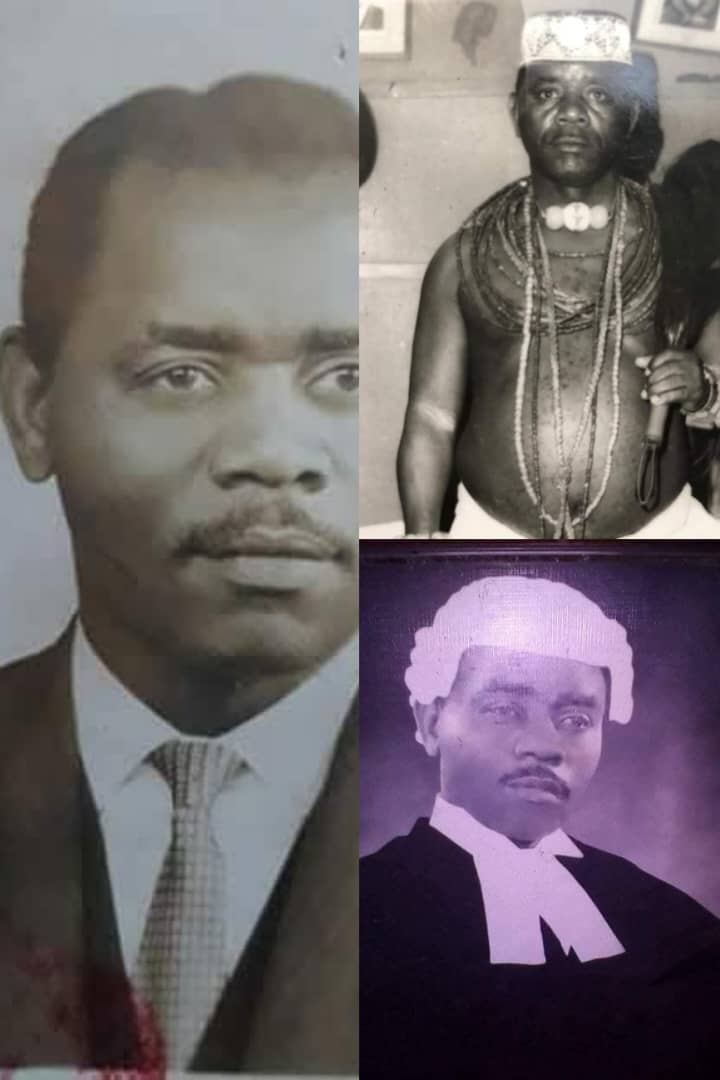
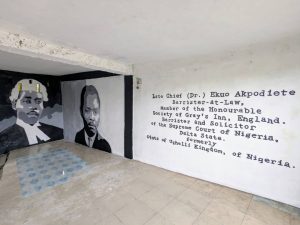
In a life of achievement, Chief Ekuogbe Akpodiete popularly called the Duke by his contemporaries in the UK was an assessment clerk, post office clerk, a court interpreter, an educationist, a business man, a political party chieftain, a Barrister and Solicitor, a Magistrate, the Otota (the Prime Minister) of Ughelli kingdom which is the highest traditional chieftaincy office that underpin the royal office of the Ovie of Ughelli Kingdom.
He was a trail blazer, a strict disciplinarian, a lover of people, and a philantropist. He saw to it that people lived in peace and happiness.
Born on the 4th of April, 1924, to parents cut from an industrious mould, Chief Ekuogbe Rowland Gregory Akpodiete took zealously to education that neither his mother Ughweriaka who was a trader, nor his father Akpodiete who was a farmer had.
He attended the Native Authority Primary School, Ughelli, and Enitona High School, Port Harcourt, for his secondary school education.
He thereafter had a brief teaching career in primary schools in Ofuoma near Ughelli, he worked as a process clerk in the then Sapele Township Department between 1950 and 1953, serving at the same time as an interpreter in the local courts.
He proceeded to the United Kingdom to seek the proverbial Golden Fleece where he worked and paid his way through, studying Law. He was admitted into the Honourable society of Gray’s Inn, England, in 1965, and shortly after, he returned home to Nigeria and attended the Nigerian Law School. He was called to the Nigerian Bar in 1966. He immediately started practice in Lagos. However, his practice in Lagos was regrettably abridged by the Nigerian Civil War, which drove him to his hometown Ughelli in 1967, where he continued to practise among his kith and kin as the first Legal Practitioner.
Chief Ekuogbe Akpodiete established himself in Ughelli. After the civil war, he served in the now defunct Mid-western State Judiciary from 1972 to 1975 as a Magistrate.
He was conferred with the chieftaincy title of Urhukperovie of Ughelli kingdom (the light of the King) by the then reigning Ovie of Ughelli, His Royal Highness Oharisi II of blessed memory in 1977.
In the quest for more knowledge, he went back to England for his Master’s degree in law (LL.M) and later a Ph.D. at the University of Warwick.
He was awarded an honourary doctorate degree (Ph.D) by Tenesse Christian University from the United States of America in 1991.
He became the Otota (the Prime Minister) of Ughelli Kingdom in 1986, an office he occupied until his demise on 9th April 1995.
Chief Ekuogbe Akpodiete was also politically involved. In the heady days of the Awolowo-led Unity Party of Nigeria, he was the party’s legal adviser in Ughelli and was on hand to assist during Chief Obafemi Awolowo’s campaign hosting in Ughelli and its environs.
In view of his love for people and entertainment, he established a popular cinema house, one of the first in Ughelli, known as REGA cinema, coined from his names, alongside an entertainment place called Unutakunu (people talk to people).
Chief Ekuogbe Akpodiete was blessed with wives and many children, grandchildren, and great grand children.
Mr. Olotu Akpodiete, PhD
Executive Director
Olotu & Ekuogbe Rowland Akpodiete foundation
-

 News11 hours ago
News11 hours agoBREAKING: Unknown gunmen reportedly storm Senator Natasha’s family residence
-

 News14 hours ago
News14 hours agoSnub story on removal of Rivers Sole Administrator, it’s FAKE-Chief Registrar
-
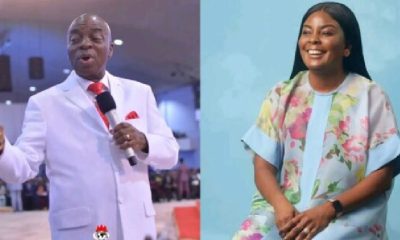
 News19 hours ago
News19 hours ago“How my father escaped assassination” – Bishop Oyedepo’s daughter
-

 News20 hours ago
News20 hours agoFG expresses sympathy for CBEX victims, urges a united effort to combat Ponzi schemes
-

 News13 hours ago
News13 hours agoSAD! Again, Alleged Herdsmen Attack Three Benue Communities
-

 News5 hours ago
News5 hours agoAbuja light rail project must be commissioned on May 29-Wike vows
-

 Politics13 hours ago
Politics13 hours agoPDP govs are jokers, can’t stop coalition train, Atiku boasts
-

 News11 hours ago
News11 hours agoLawmaker Slams NBA Over Rivers Crisis, Demands Return of N300m


